- Home
- Brian S. Wheeler
A Just Farewell
A Just Farewell Read online
PLEASE CONSIDER SUPPORTING THIS WORK
Thank you for downloading this ebook of “Heritage and Shimmer.” Should you enjoy this story, please consider supporting my efforts by visiting my website located at www.flatlandfiction.com, where you can find additional stories of science fiction, fantasy and horror. Crafting each story takes a substantial amount of time, and each act of support allows me to devote more of my day to the dreaming and writing of my stories. Please consider offering a financial show of support for this story by following the instructions found on my official website, or consider leaving a review at Smashwords to help my work attract the interest of additional readers. Thank you for your interest in this story, and readers are always encouraged to send me feedback through my email at [email protected].
Sincerely,
Brian S. Wheeler
A Just Farewell
Brian S. Wheeler
Published by Brian S. Wheeler at Smashwords
Flatland Fiction thanks you for your purchase of this ebook. This ebook remains the copyrighted property of the author and may not be reproduced, scanned, or distributed for any commercial or non-commercial use without permission from the author. Quotes used in reviews are the exception. No alteration of content is allowed. If you enjoy this ebook, Flatland Fiction encourages you to send us a review at [email protected]. Unless otherwise instructed, Flatland Fiction reserves the right to post such reviews online.
Your support and respect for the property of this author is appreciated.
This book is a work of fiction and any resemblance to persons, living or dead, or places, events or locales is purely coincidental. The characters are productions of the author’s imagination and used fictitiously.
Copyright © 2015 by Brian S. Wheeler
A Just Farewell
Brian S. Wheeler
Chapter 1 – Escaping It All
Chapter 2 – Elevating a Holy War
Chapter 3 – The Ultimate Answer
Chapter 4 – Slender Shoulders Holding the Weight of the World
Chapter 5 – Adultery Committed Against the Maker
Chapter 6 – Time to be a Man
Chapter 7 – A Lamb Taken to Slaughter
Chapter 8 – Blessed Hands
Chapter 9 – Scratching at the Sky
Chapter 10 – A Boy Given a Purpose
Chapter 11 – In the Wink of an Eye
Chapter 12 – A Sight to Inspire Prayer
About the Writer
“I built my castles in the sky after I realized that dogma would conquer our world.” – Sebastian Knopfler, architect and engineer of the castle-class space stations.
Chapter 1 – Escaping It All
“Tell me again, sweetie, what you’re going to be doing once we start our new lives on the planet Regis?”
“We’re not going to live on a planet, hun. We’re going to be living on a moon.”
“Can a person live on a moon, Blake?”
“Rachel, you’d be amazed to learn how many places we can live out there in the stars.” Blake squeezed his fiancé’s hand. “They’ll train me to be a welder while we wait in one of the space stations for the moon colony to finish settlement preparations. Once we reach our new home, I’ll be helping to build an entire new city for people just like us.”
Rachel grinned. “I’m so proud of you. It makes me so happy to imagine you building something new. Everything on this old planet Earth is ruined and wasted. But we’re going to escape it all, and you’re going to help build something great again. It thrills my heart, Blake.”
The line of passengers that curved in front of Rachel and Blake slowly trudged another few steps closer to the massive rockets waiting for their occupants on the magnetic rail tracks that would launch the machines into the heavens. Armed sentries patrolled every inch of the launch facility, and they removed passengers from the line for random pat-downs for weaponry and contraband. Rachel gripped Blake’s hand as a pair of the uniformed sentries pulled a young man out of the line only a few meters ahead of their position. One sentry trained his rifle upon the trembling stranger while his companion rummaged through the single, small bag that was the only piece of luggage any of those waiting for a rocket ride would be allowed to take with them as they started a new life amid the stars.
Rachel rested her head on Blake’s shoulder as the sentries moved further along the line. “Do you think the savages will follow us?”
“There’s no way they could follow us,” Blake smiled. “Look at all the security around this launch facility. Look at all the soldiers guarding this place. There’s just no way any of those savages could sneak aboard one of these rockets.”
“But do you think they would try to follow us anyway? Do you think they would want to follow us into the stars?”
Blake laughed very softly. “Why would they want to do that? They’ll have the entire Earth for themselves. They can do whatever they want with it. They can just go on blowing things up until there’s not a living thing left to butcher in name of their god. And how would any of those savages follow us even if they wanted to? They know nothing of building rockets and space stations. They know nothing about travelling the vast distance between the stars. They can hardly count beyond ten. The savages haven’t built anything for generations, and so they get just what they deserve. They’ll get to live in all the ash and rubble their bombs created.”
“So there’s no way they can reach us after we lift away in one of those rockets?”
Blake winked. “They can’t even reach us now.”
Rachel relaxed her grip upon Blake and did her best to be optimistic, though the site of so many armed sentries patrolling the launch facility still made her uneasy. A new life awaited them, one in which they would no longer have to live in fear of a savage infiltrating their city to detonate a maiming and killing bomb in the middle of their loved ones and neighbors. They would start a new world on a welcoming moon, and they would never be intimidated into worshipping any god, nor adhere to any bearded cleric’s faith. Most of all, they would build. Rachel smiled to think of the gardens she could plant, of how fresh tomatoes might taste, of how she might even find the time and the material to learn to paint watercolors or play an old-time piano. The savages may have made such simple pleasures beyond reach on the remains of old and wasted Earth, but the stars would remain far beyond the reach of the dogma that decimated what had once been a beautiful world.
“How many children do you think we’ll have?”
Blake kissed Rachel’s cheek. “We’ll have three girls and two boys. We’ll also have a cat and a dog.”
“I hadn’t thought of a cat and a dog. I’d very much like that.”
“I tell you, Rachel, you’re going to be amazed at the things we can have amid the stars.”
* * * * *
Chapter 2 – Elevating a Holy War
In one hand, Abraham carefully loaded his brush with orange pigment. In the other hand, he gently held the burrowing cockroach. He was proud of the brush he had crafted with strands of his own hair, just as he was proud of the paints he had mixed from the dyes he had pilfered from his mother’s loom. He feared to think how badly his father would beat him should it be discovered how he idly wasted time painting the shells of the bugs he considered his pets and friends. Yet the sense of pleasure and pride that Abraham felt whenever he looked upon the painted shells of his insect friends seemed worth the danger in the young boy’s estimation.
“Hold still, Oscar. Your shell will look wonderful with some swirls on all that orange.”
The village’s great horn shrilled just as Abraham’s brush neared the bug’s shell, and the cockroach tensed. Abraham knelt to set the bug upon the ground, and his friend scur
ried for the chamber’s corners as the horn echoed through the tunnels that composed the subterranean home of Abraham’s family.
“Abraham! Hurry to the ladder before father learns you again hesitate to answer the clerics’ summons! He won’t be so merciful with you if you’re once again the last of the village to climb up to the surface and answer that great horn’s call!”
Abraham cringed at the sound of his brother Ishmael’s voice, and he hurriedly hid the paper cups that contained his paints into a box he kept far beneath his cot. Quickly, Abraham sealed the container that held the sugar he saved from his morning tea. Ishmael would be very happy to report to their father how Abraham wasted a resource as valuable as sugar to coerce his cockroaches to come out of the shadows so that he could decorate their shells. His father and brother would tell him that sugar and paint couldn’t be wasted on such filthy bugs, and they would tell him that it would be best to simply squash those cockroaches beneath the heel of his boot. They would tell Abraham that his time would be better served in the study of the Maker’s Holy Book. Thus Abraham knew that he was not the only living creature in jeopardy of hurt should his brush, paints and sugar be discovered, and so he frantically hid all his secret treasures before Ishmael saw he had any of them in his possession. Ishmael had felt the hide of their father’s belt many times, and Ishmael would take great pleasure in witnessing someone other than himself feel that belt’s sting.
“I’ll drag you out of this home if I must, Abraham! I’ll not let you bring our family any shame because you tremble beneath the ground!”
“I’m coming!” Abraham’s voice cracked. “I’m nearly at the ladder now!”
Abraham bolted into the largest chamber of his underground home that served as his family’s great-room. The family’s most precious carpets, heirlooms passed among the generations, spread about the walls and floor to decorate the room in which his family gathered six times a day to answer their clerics’ call to prayer. Though the horn shrilled through the chamber, Abraham’s mother remained seated at her loom just as she was during any day at such a time, weaving a network of patterns and lines upon another cape to relate the another story of another of their tribe’s heroes. Though the clerics taught him that the Maker frowned upon any sentiment a boy might feel towards his mother that would in any way differentiate her from any other woman in the tribe, Abraham remained very proud of his mother. She was among the village’s best weavers and seamstresses, a woman the clerics turned towards whenever a great achievement or observance in the honor of the Maker demanded a very special and complex pattern to be threaded into a hero or cleric’s cape. Abraham knew his mother was very pious, and he knew that her soul would neither dance nor tremble when that horn wailed above the ground, knew she would not allow that horn to distract her while she worked her thread.
Abraham stole a glance at his mother while he paused at the ladder’s bottom rung. He always felt afraid whenever the clerics’ horn called him to the earth’s surface, for he hated to look into the sky and see the blocky, gray castles built by the unbelievers orbiting overhead and casting such enormous shadows upon the ground. He had always paid too much attention to the stories his grandfather had told him concerning the days when the castles still rained fire and death down from their purgatory between the Earth and the Maker’s celestial kingdom. He had ignored the advice of his father, and he had paid too close attention to those ghastly tales his grandfather relished recounting until his youngest grandson trembled and feared the dark. Abraham had discounted the clerics’ warning to never place too much faith into the words expressed by the elderly few who the Maker waited so long to invite into his heaven. Abraham had listened too intently to his grandfather, and though a full season had passed since his grandfather finally died for his Maker, Abraham still hesitated at the bottom rung of that ladder.
Abraham’s mother refused to peer away from her work, even if to only encourage her youngest son, and her final child, to climb that ladder as the clerics’ horn commanded of him. Her face, covered in the dark, tattoo swirls that adorned the features of every woman among the tribes, conveyed no indication of noticing Abraham at all. Dark, thick glasses shrouded his mother’s eyes, so that no one could tell Abraham’s mother apart from any other woman on account of her eye color. Her hair, chemically treated until it was the same silver hue that the Holy Book preached pleased the Maker and was worn by all pious women, didn’t so much as sway as Abraham’s mother kept her focus locked upon her work.
“The Maker reserves the most terrible level of Hell for cowards, brother!” Ishmael’s face appeared a second before his hand stretched into the hole and clutched Abraham’s hair to painfully pull his younger brother onto the ladder’s higher rungs. “I’ll drag you all the way across the dirt if I must.”
“But what if the unbelievers hurl their fire upon us from their castles in the sky?”
Ishmael grinned “Then they will make martyrs of us all, and you will find yourself pleasured by virgins in heaven, brother, though you never passed through the year of your man-making.”
The sun had just dipped below the horizon, but the dusk air remained humid and hot, so that Abraham pined to return to the crisper and cooler confines of his underground home. He resisted that urge and hurried to keep up with his brother as they ran towards the source of that blaring horn, a difficult challenge for a younger brother whose older brother was so quick and athletic. Ishmael’s athleticism always pleased their father, and such strengths had allowed Ishmael to quickly heal from the cleric’s final ritual that marked the final passage of a tribal boy into a tribal man. Thus Abraham’s lungs burned for the effort to stay within Ishmael’s reach as they ran to answer the clerics’ summoning horn.
Abraham wanted to fall to his knees when they reached the metal scaffolding, upon which stood the seven, bearded clerics of their tribe. But Ishmael again clutched Abraham’s hair and forced his younger brother to stand.
“You’re lucky we arrived before the clerics silenced their horn, little brother. You’ll not feel father’s belt tonight, and you’ll be able to feast with the rest of us. But I’ll not let you crumble onto the ground, no matter how your heart thunders, and no matter how your lungs burn. I’ll make sure you stand like a proud warrior.”
Abraham gasped to recover his breath as Ishmael gripped his shoulder. The moon was already full and bright, and night would offer very little cover from the eyes of the unbelievers in the castle that seemed to hover directly over their village of subterranean tunnels and chambers. The castles moved overhead like a clockwork, and it was easy to gauge the time of day by the position of those fortresses in the sky. The clerics taught Abraham that those castles were leagues above the ground, and that the Maker trapped them in a dark, cold and killing void that was set neither in mankind’s Earth nor in the Maker’s heaven. Abraham’s mind trembled to consider the immensity of those castles, for their shadows covered so much ground though they were floated so far away. Pinpoints of blue and pearl lights blinked upon the castle overhead, whose ramparts bristled with gun barrels and antennae, and Abraham shuddered to think that each blinking light was a window through which the unbelievers regarded him.
“Why have we been called out of the ground when a castle is directly overhead?” Abraham whispered to Ishmael.
Ishmael suddenly slapped Abraham across the face, and none of the men assembled in the crowd before the clerics’ scaffold tower appeared to notice the sound of Ishmael’s palm across Abraham’s cheek.
“Shut your mouth and be quiet. The clerics will tell you soon enough all you need to know.”
Abraham didn’t wish to invite a second slap from his brother, and thus he didn’t rub at the stinging side of his face. Instead, he let his eyes drift upon the capes of his neighbors who gathered at the foot of cleric’s tower of scaffolding. Each man wore a cape that was carefully woven in the patterns and markings that told histories and stories to those versed in the tribe’s language of thread and symbols. Abr
aham’s study of that expression beneath the tutelage of the clerics had only just begun, and so the boy allowed his eyes to consider the design that was unique to each cape. The capes told Abraham which men were fathers, and among those fathers those who were proud to have had sons who sacrificed themselves to the Maker’s will. The capes told Abraham which men possessed multiple wives in their home, and which still looked to marry off daughters before the end of the calendar year. The capes told Abraham which men had waged war against the unbelievers, and they told the boy who he might visit to receive a medicine to heal a sick cow or goat. And Abraham recognized the men who wore capes that marked them as guilty of striking a neighbor, or of taking the Maker’s name in vain. Abraham was proud of his ability to decipher the language expressed on those capes, and he was pleased to think that such information would remain unknown to whatever eyes looked upon them from that castle hovering above their community of holes and homes.

 Polish, Dust and Sparkle
Polish, Dust and Sparkle Old Hunters on the New Wild
Old Hunters on the New Wild Mr. Moon's Daredevil Messiahs
Mr. Moon's Daredevil Messiahs Opus Wall
Opus Wall So That a Marigold Might Live Free
So That a Marigold Might Live Free Firedrop Garnish
Firedrop Garnish Jimmy Jack and the Smartman
Jimmy Jack and the Smartman Given to Glass
Given to Glass The Sirens' Last Lament
The Sirens' Last Lament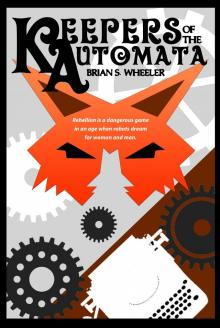 Keepers of the Automata
Keepers of the Automata The Warden's Mark
The Warden's Mark The Provenance of Monsters
The Provenance of Monsters Cat-Tooth Magic and Dog-Eared Miracles
Cat-Tooth Magic and Dog-Eared Miracles Heritage and Shimmer
Heritage and Shimmer Words Burned to Flame
Words Burned to Flame Harpies of Planet Sutherland
Harpies of Planet Sutherland The House on Maple Street
The House on Maple Street Not All Spirits Be Foul
Not All Spirits Be Foul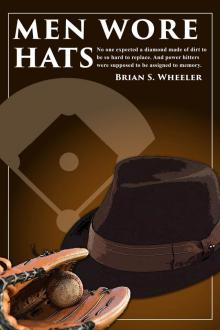 Men Wore Hats
Men Wore Hats Shadow Weapons of Doom
Shadow Weapons of Doom Glorious Gardens of Teetering Rust
Glorious Gardens of Teetering Rust Butcher, Baker and Replicant Maker
Butcher, Baker and Replicant Maker Patriots of Griffin XIII
Patriots of Griffin XIII Bones in Daylight
Bones in Daylight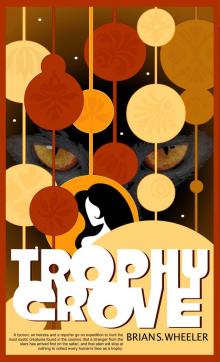 Trophy Grove
Trophy Grove Grandchildren Returning Their Spoils
Grandchildren Returning Their Spoils Floating the Balloon Bombs
Floating the Balloon Bombs Starlight, Starbright
Starlight, Starbright The Resonance of Sweet Mrs. Queen
The Resonance of Sweet Mrs. Queen Brother Keepers
Brother Keepers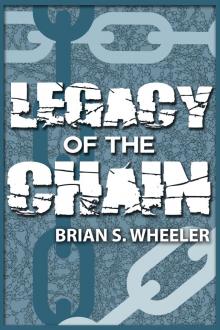 Legacy of the Chain
Legacy of the Chain The Dusty Dead in the Valley of the Blossoms
The Dusty Dead in the Valley of the Blossoms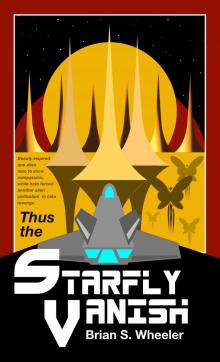 Thus the Starfly Vanish
Thus the Starfly Vanish A Cruel and Burning Ice
A Cruel and Burning Ice A Voice That Summons Monsters
A Voice That Summons Monsters The Beckford Bottom Beast
The Beckford Bottom Beast The Llungruel and the Lom
The Llungruel and the Lom The Meek
The Meek Depth of Field
Depth of Field Mary, in Need of Belle
Mary, in Need of Belle Memory, Light & Medicine
Memory, Light & Medicine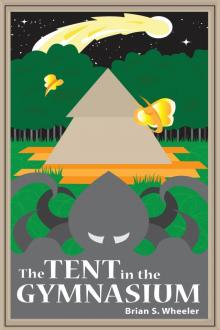 The Tent in the Gymnasium
The Tent in the Gymnasium Rooms Without Furniture
Rooms Without Furniture A Handicap of Shades
A Handicap of Shades Glass Desires
Glass Desires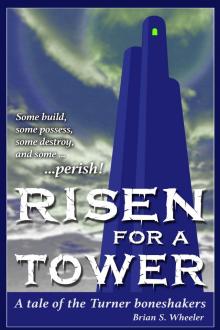 Risen for a Tower
Risen for a Tower Kennel, Kingdom and Crown
Kennel, Kingdom and Crown Plastic Tulips
Plastic Tulips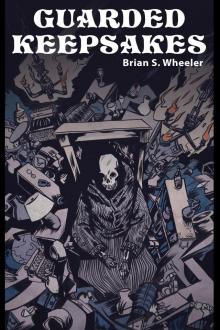 Guarded Keepsakes
Guarded Keepsakes Zombies Earning Their Hunger
Zombies Earning Their Hunger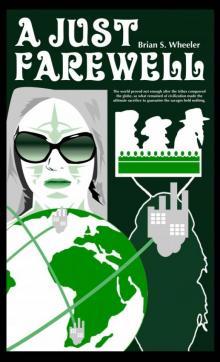 A Just Farewell
A Just Farewell